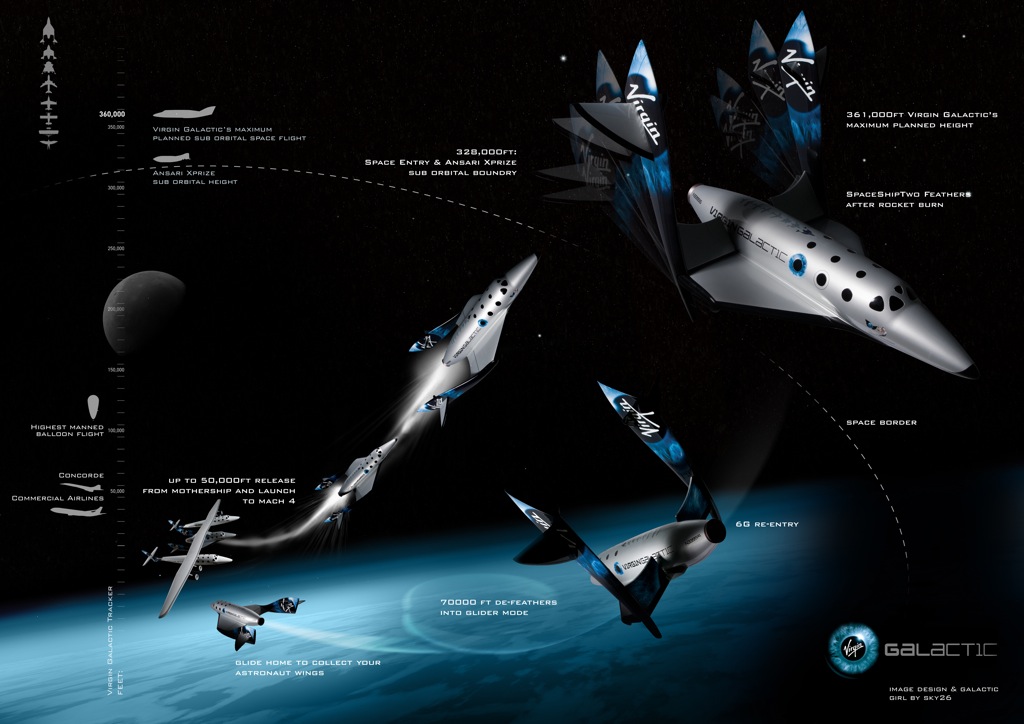[caption id="attachment_7984" align="aligncenter" width="500" caption="It does when Virgin Galactic takes wealthy folks into space"] [/caption]
[/caption]
Today's post is from a series of emails a few friends and I are having about the current state of wealthy distribution.
A rich neighborhood next to a poor one isn't likely to send their kids to the same school, or the same colleges, or have intros to the same business colleagues. But the communities share a border, and have equal say in local government*. Roads go between the neighborhoods, and wealthy folks don't want their kids hanging out in the poor parts of town. The servants and laborers for the wealthy neighborhood are very likely to come from the poorer area. This is our reality.
If a wealthy acquirer purchases and moves to their own private island and abandons society to shun it's high taxation, wealth doesn't afford them anything beyond what they leave with. Any group which doesn't obey the system where the buyer earned their wealth (pirates!) could claim the island. The island buyer would have little recourse but to negotiate with the visitors, hire their own army, or demand the government in which the property was purchased to enforce ownership rights by force.
Are we born into a type of subservience to wealth? What about societies which function nearly outside of the flow of our currency? Or is the contrary true, where we are born into a type of social debt to the people around us. Our peers can legitimately vote to increase taxes on our former earnings at any time. There is little room for the right to enormous reserves of wealth in a desperate society. The rules will continue to slide in favor of the many, at the cost of minorities. Mass inflation or the toppling of governments can leave currency valueless. Wealthy businesses and individuals constantly barter with the governments which protect them, to maintain their ongoing control of resources.
Money doesn't exist or function unless most of society believes in it, and continues to hold it sacred as a system of fair exchange. Consider the uprisings around the globe recently. The right to survive and claim more than their government legally sanctioned was enough to cause drastic political upheaval. In nations where a tiny fraction of people control the money and government, social unrest lit up like a raging inferno. Even when a majority suppresses a large minority, it's enough to cause revolutions. Some don't end well for those who rebel, as those in control have tanks and bombs. Those in power enforce their right to wealth and control by spending some of that wealth on weapons.
It's clear that wealth doesn't exist in a vacuum. I believe the right to earn and own wealthy is fundamental to capitalism and free societies. Capitalism and currency is an interesting system. Either you have it and deal with uncontrolled whacky distributions brought on by folks that work harder and/or game the system, or you get rid of it and force everyone to work like slaves or starve. Without financial incentives, who decides who does what job best or who even gets a job? I wouldn't mind a forcing function (beyond inflation) to motivate continuous reinvestment of capital. When too much money sits stagnant in one entity's control, it transforms into lost social potential. Perhaps static reserves should face higher taxation, easily avoidable through reinvestment. Money put to work tends to produce greater social wealth (healthy, somewhat stable communities).
It's a fine balancing act, and I'm not sure even our sharpest economic pros should be making large systematic changes. If there's a better way to distribute resources we haven't found it yet.
Notes:
*= The idea is every citizen gets equal representation, but the reality is it's anything but equal (lobbying).
